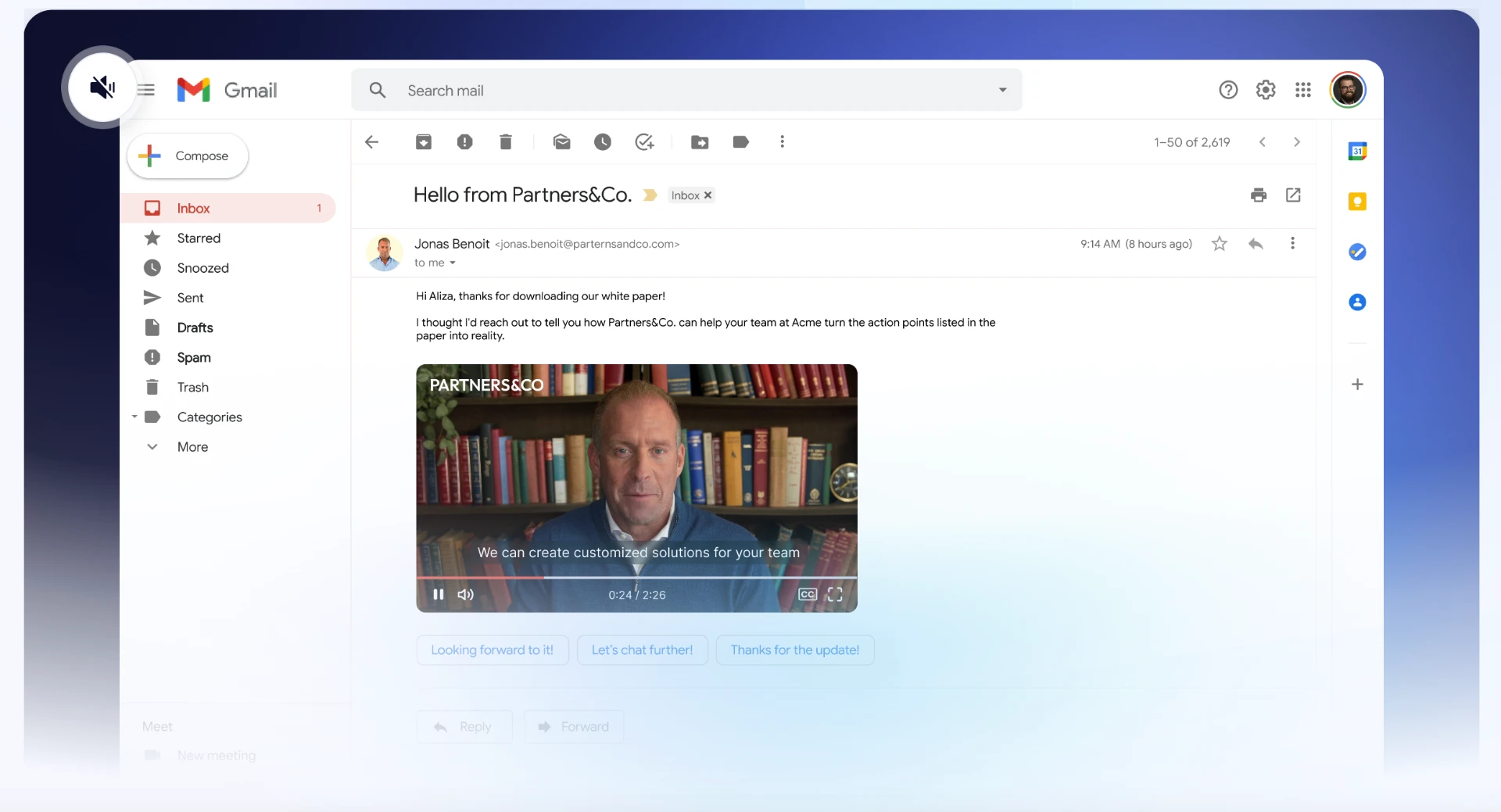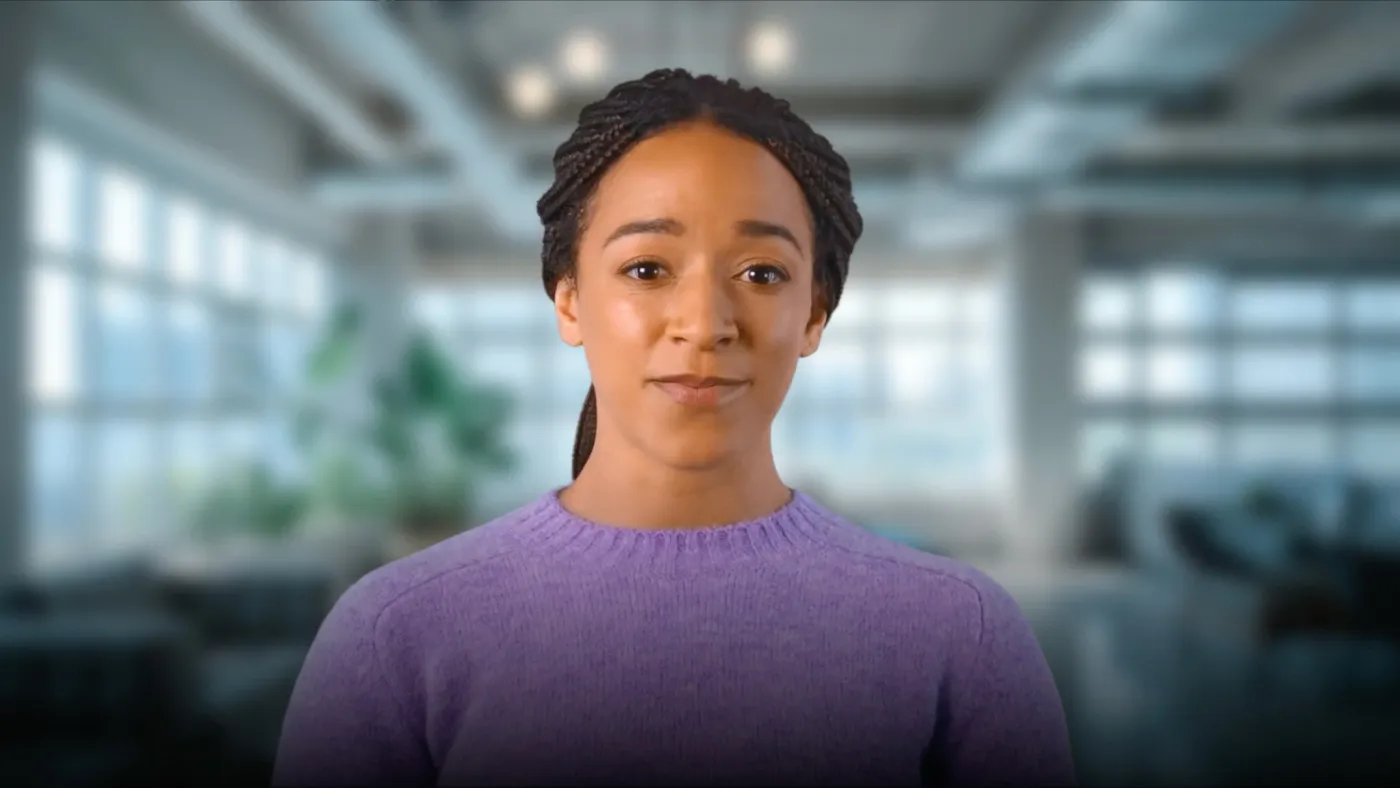Crafting Personalized Email Outreach That Gets Replies


Turn your texts, PPTs, PDFs or URLs to video - in minutes.

What is personalised outreach?
Personalized email outreach is about crafting an email that feels like it’s meant just for the prospect you’re contacting. Instead of sending a one-size-fits-all message, you customize it with specific details that make it relevant to them.
The rewards for getting email personalization rigvht are huge:
- Higher open rates: Campaign Monitor found that emails with personalized subject lines are 26% more likely to be opened
- Increased response rates: SalesLoft’s research indicates that personalized emails can increase response rates by 112% compared to generic emails
- Better click-through rates (CTR): A study from HubSpot found that personalized calls to action (CTAs) in emails lead to a 202% increase in click-through rates
- Improved conversion rates: According to an Experian Email Marketing Study, personalized email campaigns deliver a 6x higher transaction rate compared to non-personalized campaigns.
It's time to get serious about scalable, personalized outreach strategies
How to personalize an outreach email: the basics
Research your recipient
Begin with specific details about the person you’re contacting—check your prospect’s LinkedIn, Twitter, or other profiles for recent posts or updates, and reference these in your outreach. This can be as simple as mentioning a recent post they made or noting mutual connections or interests, creating a more tailored conversation starter.
Use their first name
Fairly obvious, but be sure to address the recipient by their first name to make it feel more personal.
Tailor the subject line
Make it catchy yet personalized—reference their company, recent accomplishments, or interests.
Highlight relevance
Show a clear connection between the recipient’s needs or goals and your offering.
Know their company
Reference recent company events like funding rounds, new product launches, or leadership changes. Congratulating the prospect and aligning your message with their company’s current priorities can enhance relevance and engagement.
Limit the ask and be clear
Make it easy to respond by limiting the request to one specific action, like scheduling a quick call or responding with feedback.
Keep it short and focused
Respect the recipient’s time with a clear, concise message that gets to the point quickly.
Advanced personalized email outreach strategies
About 90% of outbound sales strategy comes down to a predictable email template that starts with “Hey [First Name], we noticed you’re struggling with [generic problem], and we’re here to help.”
With every B2B sales team sending the same sort of personalized messages using the same tools, response rates are pretty poor; according to Harvard Business Review, 90% of decision-makers don't respond to cold outreach, so how can we do better?
Stategy #1: Add Personalized Video or Audio Messages
You’re doing sales outreach all day, every day, doing your best to turn that cold outreach email template into meaningful connections. But standing out is nearly impossible when you know the competition is doing the exact same thing.
You might know that video is proven to increase engagement. But you don't have the time to record hundreds of custom videos for each prospect.
That’s where AI video makers and personal avatars come to the rescue. Instead of pulling up your screen recorder 50 times, you can record a short video of yourself once and let AI do the rest.
Using a video maker like Synthesia, you can create personalized sales videos using an avatar—basically, a digital twin—that delivers your message without ever getting tired and better than you could do it. You just tweak the script to include the lead’s name, company, or unique need and the AI generates a custom video for each recipient.
Here’s an example of a custom pitch:
People are far more likely to respond when they feel like you’ve taken the time to speak directly to them. That’s why this tactic works. Your video calls them out by name and discusses their specific pains. You deliver a tailored experience that feels human and warm, thus boosting engagement and positive responses.
What you need:
- An AI video creation tool like Synthesia
- A script that feels personal and relevant to your prospect
- A few details (name, company name, challenges) to make each video feel one-of-a-kind when you're reaching out for the first time.
Step 1: Create a personal AI avatar using Synthesia
Record a short video of yourself that the AI video creator will use to generate your personal avatar.
Here’s how that works:
Now, you can use your avatar to produce AI videos in seconds.
Step 2: Write your script
You just paste your script into the AI video maker, select your personal avatar as the presenter, adjust any details for each recipient—the lead’s name, company, language, etc.—and let the AI generate the custom video.
Step 3: Scale your sales outreach
Once your video is ready, you can use this language translation feature to scale your outreach.
Simply connect Synthesia to Zapier, and you can automate your outbound sales by integrating these videos with your current outreach system—your email platform, CRM, or LinkedIn outreach tool.
This means that instead of manually sending each video, you can set up a workflow where, for example, a video is automatically generated and sent when a new prospect is added to your list.
With this level of personalization, you build stronger connections with leads, making them more likely to engage and, ultimately, more likely to convert into sales.
Strategy #2: Offer instant solution guidance for browsing prospects
When prospects visit your website and start browsing, they may be interested, but without all the information, they're not going to take the next step.
Instead of waiting for them to request more information, use AI-powered chatbots, like those from Intercom, to instantly offer relevant solutions and help guide them in the right direction.
Once the chatbot identifies a Market Qualified Lead (MQL)—someone who fits the profile of your ideal customer—it can automatically trigger follow-up actions for your outreach strategy.
For example, after a helpful chat with support, you can automatically send an email with a relevant subject line and content that recaps the key points discussed, further resources, and perhaps a direct contact for sales.
By using this personalized approach, you’re providing prospects with instant value and keeping the conversation going. You’re making them feel like you’re right there to support them as they explore. And the more you anticipate their needs and respond quickly, the more likely they are to take that next step, like booking a demo or signing up for a call.
What you need:
- An AI chatbot tool like Intercom to identify MQLs and offer instant guidance
- A follow-up system that automates personalized emails for each prospect, which typically comes in a CRM, sales prospecting tool, or email marketing tool (HubSpot, ActiveCampaign, Mailchimp, etc.)
- Optional: an AI video tool to create quick, personalized video responses that deepen the connection
Strategy #3: Use tools that allow you to get hyper-specific in your messages
If your personalized outreach can prove that you understand your prospect's business, challenges, or goals, you cut through the noise.
Mentioning current events such as the latest product launch or a recent funding announcement, shows a level of relevancy that automatically gets prospects thinking "Oh they understand where we're at."
You can either:
- Use data enrichment and gather detailed, up-to-date information on your leads such as the company’s recent activities, industry trends, or personal milestones.
- Use user-generated data that comes from self-selection on your website or in-app. Personalization tools like RightMessage can be particularly effective at this.
You can also plug in conversational AI like chatbots, virtual assistants, or automated messaging systems to generate these ultra-personalized messages automatically. By integrating your data enrichment tools with conversational AI, you’ll create messages that feel like they’ve been handcrafted, using the most relevant details about each lead to build a message that resonates deeply.
What you need:
- A data-enrichment tool like Apollo or Clearbit to gather specific lead details
- An email platform that allows for dynamic content and custom fields
- Optional: Conversational AI to generate tailored, data-driven outreach automatically
Strategy #4: Automate personalized emails based on your prospect’s actions
Let’s say a prospect downloads a whitepaper from your site. Instead of leaving them hanging, automatically send them a follow-up email a day or two later.
We’re not talking about your typical, generic "Thanks for downloading" message that everyone sends. Instead, make your following emails ultra-relevant by:
- Personalizing outreach based on the downloaded resource: Tailor the follow-up to reflect the specific topic or solution they were interested in. For instance, if they downloaded a guide on improving lead generation, your email should offer a next step directly related to that interest—maybe a case study or tool recommendation showing how your solution addresses that problem.
- Personalizing outreach based on their goals and challenges: When a prospect signs up or downloads something, ask them outcome-driven questions, such as, "Why is this problem a priority for you right now?" or "What result are you hoping to achieve?" This gives you richer data to work with, allowing you to send emails that speak directly to their pain points and desired outcomes. And it's data that you can easily pass to sales reps to help them run better demo calls.
By combining these two layers, you ensure that your personalized sales email feels like it was written specifically for them, keeping you top-of-mind and moving them closer to conversion.
To use this tactic, set up automated email workflows triggered by specific actions—downloads, sign-ups, page visits, etc. Each email should be pre-written but dynamically personalized based on what the prospect did and the information they shared.
What you need:
- An email marketing platform like HubSpot or ActiveCampaign that supports automation, segmentation, and dynamic content.
- A clear understanding of key customer touchpoints and specific questions during sign-up that reveal their goals and priorities.
Strategy #5: Send Value-Driven Content Without a Hard Sell
Provide insights, tips, or relevant resources without directly pushing a sale. This strategy builds rapport and positions you as a valuable resource, creating goodwill that can lead to more receptive responses later.
Strategy #6: Follow Up with Personalized LinkedIn Messages
After sending an email, consider following up with a friendly, non-pushy message on LinkedIn. Mentioning your email in a brief LinkedIn message can encourage a response from prospects who might not check emails as often.
Strategy #7: Use Real-Time Analytics to Time Follow-Ups
Leverage email tracking software to see when a prospect opens your email and clicks links. Follow up soon after they engage, showing you’re responsive and attentive without being intrusive.
About the author
Content Writer & Marketing Expert
Ema Lukan
Ema Lukan is a seasoned Content Writer and Marketing Expert with a rich history of collaborating with marketing agencies, SaaS companies, and film studios.
Frequently asked questions
What is personalized email outreach?
Personalized email outreach involves crafting and sending tailored email messages that are relevant to the individual recipient. This approach uses specific details about the recipient to make the email more engaging and impactful.
Why is personalized email outreach important?
Personalized emails help build better connections, increase engagement, and improve response rates, leading to stronger customer relationships and higher conversion rates.
How can I personalize my email outreach?
Personalization can be achieved by addressing the recipient by name, referencing past interactions, tailoring the content to their interests, or using video or data insights to craft a message that resonates.
How do I measure the success of personalized email outreach?
Success can be measured by tracking metrics like open rates, click-through rates, response rates, and conversion rates. Engagement metrics provide insight into how well your personalization efforts resonate with your audience.
What advanced strategies can improve personalized email outreach?
Advanced techniques include using video, adding dynamic content that changes based on user data, using behavior-triggered emails, using AI for predictive personalization, and testing different personalization tactics to optimize results.











